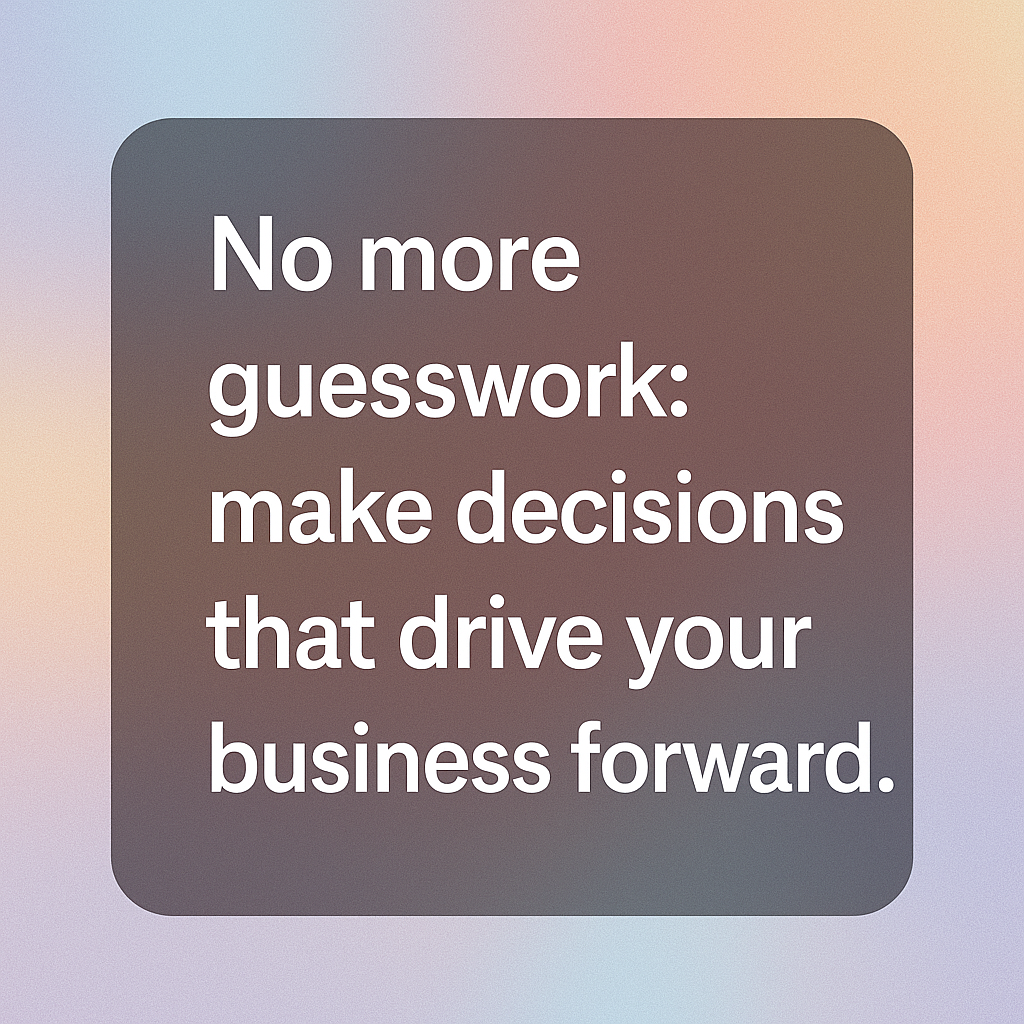
Did you know that over 80 percent of business failures can be linked to poor decision-making? Every choice you make shapes your business’s direction and long-term success. Professionals and solopreneurs alike must navigate complex decisions that influence growth, stability, and daily operations. By understanding what drives effective business decisions, you set yourself up for smarter strategies, better outcomes, and a stronger position in your field.
Table of Contents
- Defining Business Decision and Its Importance
- Types of Business Decisions for Solopreneurs
- Decision-Making Frameworks and Processes
- Tools and Techniques to Improve Decisions
- Common Pitfalls and How to Avoid Them
Key Takeaways
| Point | Details |
|---|---|
| Importance of Business Decisions | Strategic choices guide organizational direction and resource allocation, impacting growth and sustainability. |
| Decision-Making Frameworks | Structured approaches, like decisional balance sheets, help professionals objectively evaluate options and minimize risks. |
| Solopreneur Decision Types | Different solopreneur types have unique decision priorities that require tailored strategies for success. |
| Avoiding Decision-Making Pitfalls | Being aware of cognitive biases and implementing systematic evaluation processes can enhance decision quality and reduce errors. |
Defining Business Decision and Its Importance
Business decisions are strategic choices that professionals make to guide their organization’s direction, allocate resources, and achieve specific goals. These decisions fundamentally shape the trajectory of businesses, determining whether they will grow, stagnate, or potentially fail.
According to research from Decision Sciences, structured decision-making processes are critical for organizational success. Effective business decisions involve systematic analysis, considering multiple variables such as financial implications, market conditions, potential risks, and long-term strategic objectives. Professionals who master these decision-making skills can navigate complex business landscapes more confidently and successfully.
The importance of sound business decisions cannot be overstated. They impact everything from daily operational choices to transformative strategic moves. Understanding making business decisions for professionals requires developing key skills like:
- Critical thinking and analytical reasoning
- Gathering and evaluating relevant data
- Understanding potential consequences
- Managing uncertainty and risk
- Maintaining flexibility in approach
Ultimately, business decisions are not just about making choices, but about creating a strategic roadmap that aligns with your professional vision and organizational goals.
Types of Business Decisions for Solopreneurs
Business decisions for solopreneurs are multifaceted strategic choices that require careful consideration and precision. As independent professionals managing their entire business ecosystem, solopreneurs must make decisions that directly impact their operational efficiency, financial sustainability, and professional growth.
According to research from Bizway.io, solopreneurs engage in diverse decision-making processes that span operational choices, financial planning, and client relationship management. What is a solopreneur: understanding the solo business model reveals that these professionals often strategically decide when to engage part-time contractors or freelancers for specific tasks.
Research indicates that solopreneurs can be categorized into distinct types, each with unique decision-making priorities:
Here’s a summary of the unique decision-making priorities for each solopreneur type:
| Solopreneur Type | Main Decision Areas | Typical Challenges |
|---|---|---|
| Freelancers | Project selection Pricing strategies Client acquisition | Balancing workload Setting competitive rates |
| Consultants | Service packaging Expertise positioning Client relationships | Differentiation in market Securing repeat clients |
| Thought Leaders | Brand development Content creation Speaking engagements | Building authority Audience engagement |
| Agents | Partnership management Commission structures Market representation | Negotiating terms Managing multiple partners |
- Freelancers: Project selection, pricing strategies, client acquisition
- Consultants: Service packaging, expertise positioning, long-term client relationships
- Thought Leaders: Personal brand development, content creation, speaking engagements
- Agents: Partnership management, commission structures, market representation
Each decision type requires a nuanced approach that balances immediate business needs with long-term professional aspirations. Successful solopreneurs develop adaptable decision-making frameworks that allow them to pivot quickly while maintaining strategic consistency.

Decision-Making Frameworks and Processes
Decision-making frameworks are structured approaches that help professionals systematically evaluate options, minimize risks, and make informed choices. These frameworks transform complex business challenges into manageable strategic processes that guide solopreneurs toward more confident and effective decision-making.
According to research on decision support systems, these frameworks assist professionals in navigating rapidly changing and unstructured problems. Setting financial goals for solopreneurs reveals the critical importance of having a systematic approach to evaluating business opportunities and potential risks.
One powerful decision-making tool is the decisional balance sheet, which helps entrepreneurs objectively record and analyze potential advantages and disadvantages of different options. This method involves:
- Listing all potential positive outcomes
- Documenting potential negative consequences
- Assigning weighted importance to each factor
- Comparing alternative scenarios objectively
- Identifying potential blind spots in decision-making
Successful solopreneurs develop personalized decision-making processes that blend analytical thinking with intuitive understanding. By creating flexible yet structured frameworks, they can make faster, more confident decisions that align with their business goals and personal values.
Tools and Techniques to Improve Decisions
Decision improvement tools are essential strategies that help solopreneurs transform complex business challenges into actionable insights. These techniques provide structured approaches to analyze, evaluate, and optimize decision-making processes, enabling more strategic and confident choices.
According to research in Decision Sciences, various methodologies exist to enhance decision-making reliability and effectiveness. 7 Essential Business Goals for Solopreneurs highlights the importance of implementing systematic decision-making techniques that align with professional objectives.
Business decision mapping (BDM) emerges as a powerful visual technique that solopreneurs can leverage. This method involves:
- Creating detailed decision diagrams
- Articulating potential decision pathways
- Identifying potential risks and opportunities
- Visualizing complex decision scenarios
- Enhancing accountability in decision-making
Additional techniques for improving decision quality include scenario planning, data-driven analysis, and developing personal decision matrices. By continuously refining their decision-making toolkit, solopreneurs can build resilience, adaptability, and strategic thinking skills that directly contribute to business growth and personal professional development.
Common Pitfalls and How to Avoid Them
Decision-making pitfalls can derail even the most well-intentioned business strategies, particularly for solopreneurs who bear the full weight of their professional choices. These obstacles often emerge from cognitive biases, emotional reasoning, and limited perspective that can compromise strategic thinking.
Utilizing a decisional balance sheet provides a systematic approach to mitigating these risks. Setting Financial Goals for Solopreneurs emphasizes the importance of creating objective evaluation frameworks to counteract typical decision-making traps.
Common decision-making pitfalls for solopreneurs include:
- Confirmation Bias: Seeking information that only supports preexisting beliefs
- Sunk Cost Fallacy: Continuing investments in failing projects due to previous commitments
- Emotional Decision-Making: Allowing feelings to override rational analysis
- Overconfidence: Underestimating risks and overestimating personal capabilities
- Analysis Paralysis: Becoming trapped in excessive research without taking action
To overcome these challenges, solopreneurs must develop self-awareness, create structured decision-making processes, seek external perspectives, and maintain flexibility in their approach. Regularly challenging personal assumptions and creating space for critical reflection can transform potential pitfalls into opportunities for growth and strategic refinement.
Streamline Your Business Decisions with AI-Powered Support
Making business decisions can feel overwhelming when balancing multiple roles as a solopreneur. From avoiding common pitfalls like analysis paralysis to managing pricing strategies and client relationships, the challenges are real and often stressful. You need a reliable way to organize your decision-making framework, track opportunities, and act with confidence every day.

Discover how Fluum acts as your AI-powered co-founder, consolidating essential tools into one easy platform. Whether you are refining your sales funnels, automating client bookings, or integrating payments seamlessly with Stripe, Fluum helps you reduce uncertainty and improve decision quality. Don’t let complex choices slow you down. Take control of your business growth now with Fluum pricing and plans that fit your goals. Start making smarter decisions today and transform your solo venture into a thriving success.
Frequently Asked Questions
What are the key skills needed for effective business decision-making?
Effective business decision-making requires skills such as critical thinking, analytical reasoning, data evaluation, understanding potential consequences, and risk management. Additionally, maintaining flexibility in your approach is essential.
How can solopreneurs improve their decision-making processes?
Solopreneurs can improve their decision-making processes by utilizing structured frameworks like decisional balance sheets and business decision mapping, as well as incorporating techniques such as scenario planning and data-driven analysis.
What common pitfalls should solopreneurs avoid in decision-making?
Common pitfalls include confirmation bias, sunk cost fallacy, emotional decision-making, overconfidence, and analysis paralysis. Awareness and structured processes can help mitigate these risks.
What is the importance of decision-making frameworks for solopreneurs?
Decision-making frameworks provide structured approaches to evaluate options, reduce risks, and make informed choices, helping solopreneurs navigate complex business challenges successfully.
Recommended
- Understanding Making Business Decisions For Professionals
- 7 Essential Business Goals Objectives For Solopreneurs
- Setting Financial Goals For Solopreneurs: The Full Guide
- Fluum | Effective Stress Management Techniques for Busy Professionals
- Fluum | How to Onboard Clients Effectively for Lasting Success
- Fluum | Master Managing Multiple Projects for Success
- Fluum | Build Your Brand with a Branding Builder in 2025
- Fluum | 7 Customer Retention Examples to Boost Your Business



